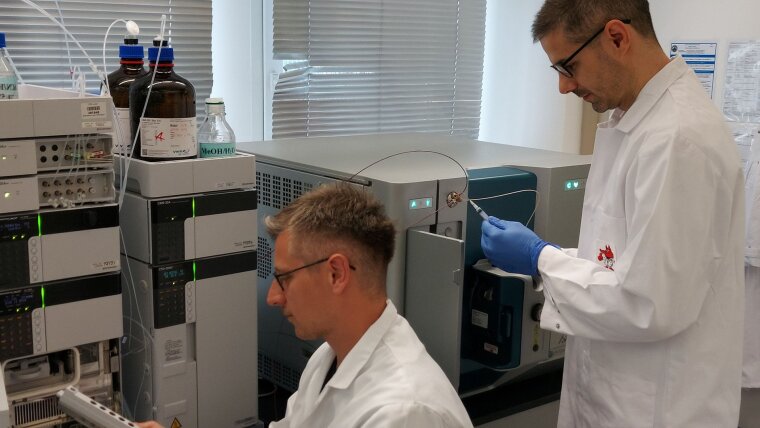
- Life
- Research
Published: | By: Nils Helge Schebb
Fatty acids and the substances formed from them play an important role in inflammation in the human body—and therefore also in health and disease progression. However, the quantitative analysis of such compounds poses considerable technical challenges for research. An international team of around 100 scientists has now developed comprehensive guidelines for the standardised quantification of oxidised fatty acids using liquid chromatography-mass spectrometry (LC-MS). The results of this collaboration were published on 20 May in the renowned journal "Science Signaling".
Many special lipids (fats) act as the body's own messenger substances and are significantly involved in inflammatory reactions and immune regulation. There are different types of lipids. Among the most important are oxidised fatty acids, also known as oxylipins. Their medical relevance is high—for example, the effect of aspirin is based on the inhibition of certain oxylipins. Although numerous of these molecules have been identified since the 1930s, many of their biological functions are still not completely understood. With the growing interest in oxylipins, there is an increasing need for reliable analytical methods that allow sensitive and selective quantification of these substances while offering high performance.
Guidelines for complex analysis
State-of-the-art targeted liquid chromatography (LC) tandem mass spectrometry (MS/MS) techniques enable the routine analysis of over 100 individual molecular species at low levels in a single analytical run. However, due to the high complexity of oxylipin analysis, there is still a great need for support, especially for researchers who are new to this field. This is where the new publication comes in: Under the leadership of Prof. Schebb (Bergische Universität Wuppertal) and with the participation of Prof. Dr Oliver Werz's research group at Friedrich Schiller University Jena, the International Lipidomics Society's (ILS) "Oxylipin Analysis" interest group has now developed common standards for oxylipin analysis in collaboration with around 100 international scientists from more than 70 research institutions. "The recently published recommendations contain technical specifications for oxylipin analyses in laboratories that reflect the current state of the art in research. They particularly address the needs of basic research, which serves to better understand the mechanisms of illnesses," says Prof. Schebb.
Background: What is liquid chromatography-mass spectrometry (LC-MS)?
Liquid chromatography-mass spectrometry (LC-MS) is a sensitive analytical method used in modern chemistry and biomedicine to precisely analyse complex mixtures of substances.
This is how it works:
In a first step, liquid chromatography (LC) separates the components of a sample—allowing the different substances to pass through one after the other. Mass spectrometry (MS) then identifies and measures these substances based on their mass and chemical structure.
The method is particularly suitable for analysing small molecules such as oxylipins, but also for pharmaceuticals and vitamins. It enables the parallel quantification of very low concentrations—a requirement for many medical and life science issues.
Original publication:
Schebb N.H. et al: "Technical recommandations for analysing oxylipins by liquid chromatography-mass spectrometry", Science Signaling, 2025 May 20 (DOI: 10.1126/scisignal.adw1245External link)